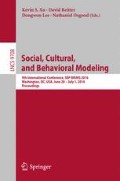Abstract
Friendship is a fundamental characteristic of human beings and usually assumed to be reciprocal in nature. Despite this common expectation, in reality, not all friendships by default are reciprocal nor created equal. Here, we show that reciprocated friendships are more intimate and they are substantially different from those that are not. We examine the role of reciprocal ties in inducing more effective peer pressure in a cooperative arrangements setting and find that the directionality of friendship ties can significantly limit the ability to persuade others to act. Specifically, we observe a higher behavioral change and more effective peer-influence when subjects shared reciprocal ties with their peers compared to sharing unilateral ones. Moreover, through spreading process simulation, we find that although unilateral ties diffuse behaviors across communities, reciprocal ties play more important role at the early stages of the diffusion process.
Access this chapter
Tax calculation will be finalised at checkout
Purchases are for personal use only
References
Aharony, N., Pan, W., Ip, C., Khayal, I., Pentland, A.: Social fMRI: investigating and shaping social mechanisms in the real world. Pervasive Mob. Comput. 7(6), 643–659 (2011)
Almaatouq, A., Radaelli, L., Pentland, A., Shmueli, E.: Are you your friends? friend’ poor perception of friendship ties limits the ability to promote behavioral change. PLoS ONE 11(3), 1–13 (2016)
Aral, S., Walker, D.: Identifying influential and susceptible members of social networks. Science 337(6092), 337–341 (2012)
Aral, S., Walker, D.: Tie strength, embeddedness and social influence: a large scale networked experiment. Manage. Sci. 60, 1352–1370 (2014)
Centola, D.: The spread of behavior in an online social network experiment. Science 329(5996), 1194–1197 (2010)
Centola, D.: An experimental study of homophily in the adoption of health behavior. Science 334(6060), 1269–1272 (2011)
Centola, D., Macy, M.: Complex contagions and the weakness of long ties1. Am. J. Sociol. 113(3), 702–734 (2007)
Christakis, N.A., Fowler, J.H.: The spread of obesity in a large social network over 32 years. New Engl. J. Med. 357(4), 370–379 (2007)
Eagle, N., Pentland, A.: Reality mining: sensing complex social systems. Pers. Ubiquit. Comput. 10(4), 255–268 (2006)
Ford, P., Clifford, A., Gussy, K., Gartner, C.: A systematic review of peer-support programs for smoking cessation in disadvantaged groups. Int. J. Environ. Res. Public Health 10(11), 5507–5522 (2013)
Fowler, J.H., Christakis, N.A.: Dynamic spread of happiness in a large social network: longitudinal analysis of the framingham heart study social network. BMJ. Br. Med. J. 338, 23–27 (2009)
Granovetter, M.S.: The strength of weak ties. Am. J. Sociol. 78, 1360–1380 (1973)
Hartup, W.W.: Adolescents and their friends. New Dir. Child Adolesc. Dev. 1993(60), 3–22 (1993)
Hartup, W.W.: The company they keep: friendships and their developmental significance. Child Dev. 67(1), 1–13 (1996)
Laursen, B.: Close friendships in adolescence. New Dir. Child Adolesc. Dev. 1993(60), 3–32 (1993)
Madan, A., Cebrian, M., Moturu, S., Farrahi, K., Pentland, A.: Sensing the “health state" of a community. IEEE Pervasive Comput. 11(4), 36–45 (2012)
Madan, A., Moturu, S.T., Lazer, D., Pentland, A.S.: Social sensing: obesity, unhealthy eating and exercise in face-to-face networks. In: Wireless Health 2010, pp. 104–110. ACM (2010)
Mani, A., Rahwan, I., Pentland, A.: Inducing peer pressure to promote cooperation. Sci. Rep., vol. 3 (2013)
May, S., West, R.: Do social support interventions (buddy systems) aid smoking cessation? a review. Tob. Control 9(4), 415–422 (2000)
de Montjoye, Y.A., Stopczynski, A., Shmueli, E., Pentland, A., Lehmann, S.: The strength of the strongest ties in collaborative problem solving. Sci. Rep., vol. 4 (2014)
Rotheram-Borus, M.J., Tomlinson, M., Gwegwe, M., Comulada, W.S., Kaufman, N., Keim, M.: Diabetes buddies peer support through a mobile phone buddy system. Diab. Educ. 38(3), 357–365 (2012)
Stock, S., Miranda, C., Evans, S., Plessis, S., Ridley, J., Yeh, S., Chanoine, J.P.: Healthy buddies: a novel, peer-led health promotion program for the prevention of obesity and eating disorders in children in elementary school. Pediatrics 120(4), e1059–e1068 (2007)
Vaquera, E., Kao, G.: Do you like me as much as i like you? friendship reciprocity and its effects on school outcomes among adolescents. Soc. Sci. Res. 37(1), 55–72 (2008)
Author information
Authors and Affiliations
Corresponding author
Editor information
Editors and Affiliations
Rights and permissions
Copyright information
© 2016 Springer International Publishing Switzerland
About this paper
Cite this paper
Almaatouq, A., Radaelli, L., Pentland, A., Shmueli, E. (2016). The Role of Reciprocity and Directionality of Friendship Ties in Promoting Behavioral Change. In: Xu, K., Reitter, D., Lee, D., Osgood, N. (eds) Social, Cultural, and Behavioral Modeling. SBP-BRiMS 2016. Lecture Notes in Computer Science(), vol 9708. Springer, Cham. https://doi.org/10.1007/978-3-319-39931-7_4
Download citation
DOI: https://doi.org/10.1007/978-3-319-39931-7_4
Published:
Publisher Name: Springer, Cham
Print ISBN: 978-3-319-39930-0
Online ISBN: 978-3-319-39931-7
eBook Packages: Computer ScienceComputer Science (R0)

